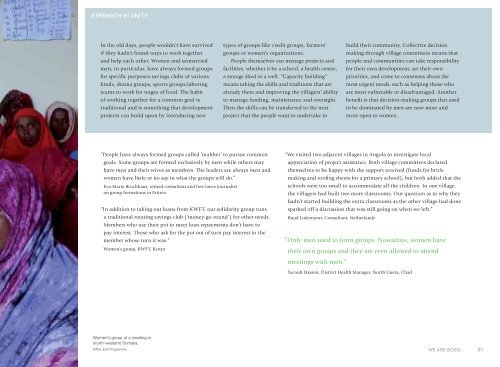You also want an ePaper? Increase the reach of your titles
YUMPU automatically turns print PDFs into web optimized ePapers that Google loves.
STRENGTH IN UNITY<br />
In the old days, people wouldn’t have survived<br />
if they hadn’t found ways to work together<br />
and help each other. Women and unmarried<br />
men, in particular, have always <strong>for</strong>med groups<br />
<strong>for</strong> specific purposes:savings clubs of various<br />
kinds, drama groups, sports groups,laboring<br />
teams to work <strong>for</strong> wages of food. The habit<br />
of working together <strong>for</strong> a common goal is<br />
traditional and is something that development<br />
projects can build upon by introducing new<br />
types of groups like credit groups, farmers’<br />
groups or women’s organizations.<br />
People themselves can manage projects and<br />
facilities, whether it be a school, a health centre,<br />
a storage shed or a well. “Capacity building”<br />
means taking the skills and traditions that are<br />
already there and improving the villagers’ ability<br />
to manage funding, maintenance and oversight.<br />
Then the skills can be transferred to the next<br />
project that the people want to undertake to<br />
build their community. Collective decision<br />
making through village committees means that<br />
people and communities can take responsibility<br />
<strong>for</strong> their own development, set their own<br />
priorities, and come to consensus about the<br />
most urgent needs, such as helping those who<br />
are most vulnerable or disadvantaged. Another<br />
benefit is that decision-making groups that used<br />
to be dominated by men are now more and<br />
more open to women.<br />
“People have always <strong>for</strong>med groups called ‘mahber’ to pursue common<br />
goals. Some groups are <strong>for</strong>med exclusively by men while others may<br />
have men and their wives as members. The leaders are always men and<br />
women have little or no say in what the groups will do.”<br />
Eva-Maria Bruchhaus, retired consultant and free-lance journalist<br />
on group <strong>for</strong>mations in Eritrea<br />
“In addition to taking out loans from KWFT, our solidarity group runs<br />
a traditional rotating savings club (‘money-go-round’) <strong>for</strong> other needs.<br />
Members who use their pot to meet loan repayments don’t have to<br />
pay interest. Those who ask <strong>for</strong> the pot out of turn pay interest to the<br />
member whose turn it was.”<br />
Women’s group, KWFT, Kenya<br />
“We visited two adjacent villages in Angola to investigate local<br />
appreciation of project assistance. Both village committees declared<br />
themselves to be happy with the support received (funds <strong>for</strong> brickmaking<br />
and roofing sheets <strong>for</strong> a primary school), but both added that the<br />
schools were too small to accommodate all the children. In one village,<br />
the villagers had built two more classrooms. Our question as to why they<br />
hadn’t started building the extra classrooms as the other village had done<br />
sparked off a discussion that was still going on when we left.”<br />
Ruud Ludemann, Consultant, Netherlands<br />
“Only men used to <strong>for</strong>m groups. Nowadays, women have<br />
their own groups and they are even allowed to attend<br />
meetings with men.”<br />
Yacoub Hassan, District Health Manager, North Guéra, Chad<br />
Women’s group at a meeting in<br />
(north-western) Somalia.<br />
©The Joint Programme<br />
WE ARE BOSS!<br />
61

















